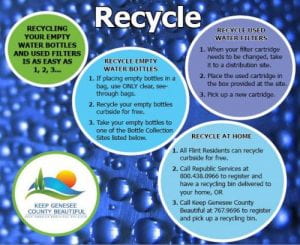My webpage focuses on a city who has been impacted by poor government decisions. To protect the city, we must take a sustainable approach. Government and the community must work together to create a safer environment for all in Flint Michigan. There have been numerous policies set in place since April of 2014 to repair the damage done to the health of the citizens. These policies included making Flint water safe for drinking and reversing the pollutants from decades ago. The four areas that Flint has focused on to preserve sustainability is the quality of life and well being, helping present and future generations, justice and equity, and living within the ecosystem.
Quality of Life and Well being: Flint has done this by switching the water source back to Detroit and trying to find a permanent solution for their water source. They have begun repairing pipes and bringing attention back to the safety of the people.
Helping Present and Future Generations: By repairing the city now and teaching the community how to prevent situations like this from occurring again this is helping the future. Today, they have classes to educate the people in the community about water safety and actions to take in order to protect their children and their family members from a water crisis.
Justice and Equity: Over the years there has been many law suits against the city of Flint and the state of Michigan for letting this injustice happen. The city has responded by making sure everyone has been given the same options. Bottled water and filtration systems have been disseminated to people who have little means. They have also created funding to support low income families with new pipelines and clean water.
 Living Within The Ecosystem: One thing the people of Flint have learned is the power of pollution. Since the crisis they have set up programs in order to create a greener city. In 2015, Flint was recognized for their Flint Farmers Market. The city has put policies in place to make their city better by producing their own goods, living off the land and reducing their carbon footprint.
Living Within The Ecosystem: One thing the people of Flint have learned is the power of pollution. Since the crisis they have set up programs in order to create a greener city. In 2015, Flint was recognized for their Flint Farmers Market. The city has put policies in place to make their city better by producing their own goods, living off the land and reducing their carbon footprint.